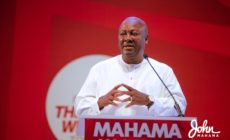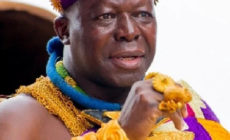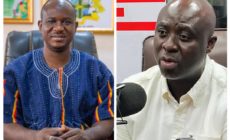NDC probes Prez. Mahama’s defeat
- Posted on
- Comment
 Shocked by the defeat it suffered at the hands of the opposition New Patriotic Party (NPP) in the December 7, 2016 general election, the outgoing National Democratic Congress (NDC) has set up a 13-member committee to investigate the circumstances under which it was humiliated at the polls.
Shocked by the defeat it suffered at the hands of the opposition New Patriotic Party (NPP) in the December 7, 2016 general election, the outgoing National Democratic Congress (NDC) has set up a 13-member committee to investigate the circumstances under which it was humiliated at the polls.
The NDC lost both the presidential and the parliamentary elections to the NPP, trailing behind the latter with over 1.2 million votes.
NPP’s presidential candidate, Nana Addo Dankwa Akufo-Addo, emerged winner and his party is dominating parliament with 171 out of the 275 seats, while the NDC managed to get 104, thereby dropping about 50 parliamentary seats.
Until then, the NDC used to control the House with 148 seats, whiles the NPP had 122.
In the case of the presidential election, Nana Akufo-Addo beat incumbent John Dramani Mahama with 5,716,026 votes, representing 53.85%; and the latter garnered 4,713,277 votes, representing 44.40% – making him a one-term president.
This has compelled the leaders of the NDC to go hunting for reasons why they suffered such a humiliating defeat – which has since thrown the party into a state of confusion and finger pointing at one another over the defeat.
The committee is expected to be chaired by former Minister of Finance and current Chairman of the National Development Planning Commission (NDPC), Professor Kwesi Botchway, who has kept a low profile for some time now.
Under-fire National Organizer of the party had blamed ‘systems failure’ as the reason for the party’s defeat at the polls.
According to Kofi Adams, who was also the National Campaign Coordinator of President John Mahama’s second term unsuccessful bid, the party’s Information Technology (IT) system (IT) set up to monitor the election results did not help the ruling party on election day.
“I think there was a system failure,” he said and insisted that the NDC had a “solid campaign strategy.”
A statement issued in Accra yesterday disclosing the probe said, “The Functional Executive Committee of the NDC, with the approval of the Council of Elders, has established a 13-member committee to investigate the cause(s) of the party’s abysmal loss to the NPP in the 2016 General Election and recommend the way forward.”
According to the NDC, the committee is expected to conduct hearings amongst the rank and file of the party, as well as solicit views from members of the party across the country for review and then restructure it (party).
Later at a press conference at the party’s Adabraka headquarters in Accra, General Secretary of the NDC, Johnson Asiedu Nketia, said the committee was to submit its report within 90 days after its inauguration.
He named members of the committee as outgoing Speaker of Parliament and former MP for Ave-Avenor [now Akatsi South], Edward Doe Adjaho; former NDC General Secretary, Alhaji Huudu Yahaya; Naval Captain (Rtd) Asase Gyimah; the party’s Director of Research, William Ahadzie; Ibrahim Zuberu, a lecturer at Accra Technical University and member of the party.
The rest are Razak Abu, a member of the party’s research team; former MP for Agotime-Ziope, Juliana Azumah Mensah; Barbara Serwah Asamoah, outgoing deputy minister for Lands and Forestry and four other members from the parliamentary caucus.
According to Mr Asiedu Nketia, the committee would “review and validate the results of the 2016 presidential and parliamentary elections and find out the causes of the poor performance of the NDC in both the presidential and the parliamentary elections, as well as deal with other matters reasonably related to the above objectives and to make recommendations to the National Executive Committee about the way forward.”
However, skeptics are saying that the party should not look far since the NDC’s own internal assessment ahead of the December polls indicated that it was losing nothing less than 48 parliamentary seats.
The findings of a research commissioned by the party to assess its chances in the elections painted a gloomy picture about its ability to win the elections because the odds were against it.
A copy of the report states emphatically, “The outcome of the teamwork indicates several developments will negatively militate against the chances of the NDC retaining power. Winning the 2016 elections should be seen as a herculean task for all stakeholders in the party.”
It also stated, “As to who may win the presidential poll on December 7, the research team is of the view that the NPP’s flag bearer is ahead of the president.”
The research team visited all the 275 constituencies across the country and interacted with a cross-section of the people.
Even though the NDC currently controls majority in parliament with 148 seats as against 122 by the New Patriotic Party (NPP), one for the Convention People’s Party (CPP) and one for the People’s National Congress (PNC), the team said, “Barring any unforeseen changes, the NDC risks losing 48 of the seats it presently occupies.”
By Charles Takyi-Boadu










 (Selorm) |
(Selorm) |  (Nana Kwesi)
(Nana Kwesi)